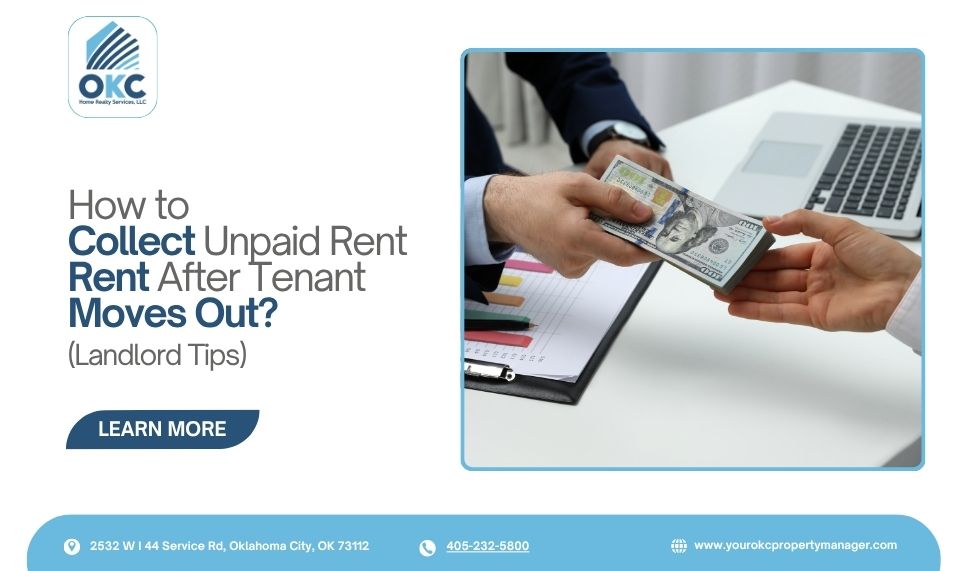Discovering that a tenant moved out owing you rent is one of the most frustrating situations you’ll face as a landlord. Unpaid rent after a tenant moves out hits you fast; missing income, sudden repairs and a gap you didn’t budget for. If you’re wondering how to collect unpaid rent after a tenant moves out, you’re not alone. I have worked with Oklahoma landlords for almost 20 years, and this issue shows up more often than you’d expect.
Unfortunately, it’s a common issue; data from Consumer Financial Protection Bureau, shows the fraction of renters incurring late fees rose from 15.4% at the end of 2021 to a peak of 23% in early 2023, although it declined to about 14% by November 2024.
What makes this situation even trickier is that you need to balance moving quickly to recover your losses while following the proper legal procedures. Skip a step, and you could end up in legal trouble yourself or lose your right to collect what you’re owed. That’s exactly why with my experience, I created this comprehensive guide to help you navigate the legal process and recovery options with confidence. More importantly, I’ll share proven strategies to prevent this nightmare from happening again in your rental business.
What are Your Options When A Tenant Leaves Without Paying Rent?
When you discover a tenant has left without paying rent, your first instinct might be to panic or immediately jump into legal action. But hold on; there’s a strategic order to follow that will maximize your chances of recovering the money while keeping you on the right side of the law.
In my experience managing properties across Oklahoma, I’ve found that about 30-40% of unpaid rent cases get resolved just by following proper documentation and communication procedures; without ever stepping foot in a courtroom.
Below are the steps you should follow:
1. Confirm If the Tenant Has Really Moved Out
This might sound obvious, but you’d be surprised how many landlords get into legal trouble by assuming a tenant has abandoned the property when they’ve actually just gone on vacation or a business trip.
Before taking any action on unpaid rent, you need concrete evidence that the tenant has actually vacated. Look for these signs:
- All personal belongings removed
- Utilities shut off in their name
- Mail piling up, keys returned
- Keys returned or a formal written notice from the tenant about moving out
- No response to written notices
According to landlord-tenant law, you must complete the full legal eviction process before taking possession of the property. This means serving proper notices, filing court paperwork if necessary, and obtaining a court order. Only after receiving a valid eviction judgment can you legally change the locks or remove any remaining belongings.
If you’re uncertain whether the tenant has truly abandoned the property, document everything. Take photos, check with neighbors, and attempt to contact the tenant through multiple channels. Keep records of all your attempts to reach them; these documents will be crucial if you end up in court.
For situations where a tenant has clearly left before the lease agreement has expired, you still need to follow proper procedures before pursuing unpaid rent. The confirmation step protects you from accusations of illegal lockouts or wrongful eviction.
2. Review Your Lease Agreement
Your lease agreement is your roadmap for collecting unpaid rent; it’s also your most important piece of evidence if you end up in court. This is the time to pull it out and read every single clause carefully.
For instance, most Oklahoma leases outline:
- Rent due dates and late-fee structures
- Grace periods
- Notice requirements
- Security-deposit rules
- Owner remedies for unpaid rent after move-out
- Collections and attorney fee clauses
Make sure the unpaid balance follows the lease terms. If the lease clearly states fees, notice procedures, and tenant obligations, you are already in a stronger position; both for negotiation and for court.
Something many landlords overlook is that your lease agreement must comply with landlord-tenant laws. If your lease contains illegal clauses or contradicts state law, those provisions won’t hold up in court. For example, you cannot waive a tenant’s right to proper notice, and you cannot include “self-help” eviction clauses.
Make copies of your lease agreement now; you’ll need them for demand letters, small claims court filing, and potentially for an attorney. The lease, combined with payment records showing what’s owed, forms the foundation of your case for collecting unpaid rent.
3. Send a Letter to Tenant Notifying them of Outstanding Rent
Once you’ve confirmed the tenant has moved out and reviewed your lease agreement, your next step is sending a formal demand letter. This isn’t just a courtesy; it’s a critical legal step that can make or break your case if you end up in court.
The demand letter, often called an “unpaid rent notice” or “final demand for payment,” serves multiple purposes. First, it gives the tenant one last chance to pay voluntarily, which saves you time and legal fees. Second, it creates a paper trail proving you attempted to resolve the issue before taking legal action. Third, it demonstrates to a judge that you acted reasonably and professionally.
Your notice should include:
- The exact amount owed (rent, late fees, and any allowed charges)
- Dates the rent covers
- Payment instructions
- A clear deadline for response
- A statement that you may pursue legal remedies if unpaid
Always send this letter via certified mail with a return receipt requested. This costs a few extra dollars but provides proof the tenant received your notice; which is essential if you file a lawsuit. Also send a copy via regular mail to increase the chances they’ll actually see it.
In your letter, include your contact information and payment methods. Sometimes tenants genuinely want to pay but don’t know how to reach you after moving out. I’ve seen situations where a simple demand letter resulted in full payment within a week because it opened communication channels.
If the tenant doesn’t respond to your letter, don’t send multiple follow-ups. One formal demand is sufficient for legal purposes. Your next step will be a more serious action.
4. Use the Security Deposit to Cover Unpaid Rent
The security deposit is often your quickest route to recovering at least part of what you’re owed. However, you must follow the state specific regulations on security deposit deductions, or you could face penalties that exceed the original debt. In case of Oklahoma, you can apply the security deposit toward unpaid rent under 41 O.S. § 115, as long as you follow the required process.
But here’s that catch: you must provide an itemised written statement of all deductions within 45 days of the tenant vacating. And if the security deposit doesn’t cover the full amount, you can still pursue the remaining balance through other methods.
What if the tenant demands their deposit back despite owing rent? Stand your ground. As long as you provide the proper itemized statement within the legal timeframe, you’re within your rights. Some landlords make the mistake of keeping the entire security deposit without proper documentation, thinking “they owe me money anyway.” This backfires. I’ve seen cases where landlords had to pay double or triple the security deposit amount in penalties because they failed to provide the required itemized statement on time.
5. File a Lawsuit in Small Claim Court
When demand letters and security deposits don’t work, small claims court becomes your most practical option. Small claims court is specifically designed for people without attorneys; the process is simpler, faster, and less expensive than regular civil court. In Oklahoma, you can file a small claims case for amounts up to $10,000 under 12 O.S. § 1751, which covers most residential rent disputes. Here’s how the process works:
Step 1: File a complaint
Visit your county courthouse or their website to obtain the small claims forms. You’ll need to provide the tenant’s current address (or last known address), the amount owed, and a brief explanation of why they owe it. Include copies of your lease agreement, payment records, demand letters, and any other relevant documentation.
Step 2: Serve the tenant
After the complaint is filed, you need to serve the tenant according to the instructions provided by the court. You might need to hand deliver the complaint or send it by certified mail.
Step 3: Wait for a response
The tenant has a specific timeframe (usually 20-30 days) to file a written response. If they do not respond, then a judgment will be entered against them. If they do respond, then the case will be set for a hearing.
Step 4: Attend the hearing
At the hearing, you and the tenant will have an opportunity to present your own evidence and argue the case before a judge. Present your case clearly and factually. Explain when the tenant moved in, what rent they agreed to pay, which months went unpaid, your attempts to collect, and the total amount now owed.
Step 5: Receive a decision
If the judge rules in your favor, you’ll receive a court order stating the tenant owes you a specific amount. This is your legal ammunition for collection. If the tenant doesn’t pay the judgment, then you may take legal steps to collect it, such as garnishing their wages.
6. Get an Attorney
Sometimes the situation is complicated enough that hiring an attorney becomes necessary, despite the added expense. Let me be honey with you; attorney fees can quickly exceed the amount of unpaid rent that you’re trying to collect, so this option requires careful consideration.
When does hiring an attorney make sense? If the unpaid rent exceeds the small claims limit, if the tenant has their own lawyer, if there are complex legal issues, or if the tenant has significant assets worth pursuing.
An experienced attorney understands landlord-tenant laws, drafts legally sound demand letters, handles all court procedures properly, and most importantly, knows how to execute judgments through wage garnishments and property liens. They can also help you understand what landlords cannot do during collection, preventing violations that could result in you being sued.
My practical advice: for unpaid rent under $3,000 with solid documentation, handle it yourself. For $3,000-$10,000, get an attorney consultation then potentially handle small claims yourself. Over $10,000 or with complications, hiring an attorney usually makes sense.
What are the Alternatives to Lawsuit?
Not every unpaid rent situation requires going to court. In fact, litigation should often be your last resort, not your first move. There are several alternatives that can save your time, money, and stress while still recovering what you’re owed.
1. Collection Agencies
You can rely on licensed collection agencies when tenants refuse to respond. They typically take 25-50% of recovered amounts but handle all the legwork. They’ll pursue the debt aggressively, report to credit bureaus, and may have better success locating tenants who’ve disappeared.
2. Mediation Services
They provide a neutral third party to facilitate negotiations. Many counties offer free or low-cost mediation programs specifically for landlord-tenant disputes. This can preserve relationships and reach creative solutions courts can’t offer.
3. Credit reporting
It can be powerful leverage. Threatening to report unpaid rent to credit bureaus often motivates payment since it impacts the tenant’s ability to rent elsewhere or secure loans.
How To Collect Unpaid Rent After Eviction?
Winning an eviction case doesn’t automatically put money in your pocket. . Many landlords are surprised to learn that eviction and rent collection are actually two separate legal processes. The eviction gets the tenant out of your property, but collecting the unpaid rent requires additional steps.
First, you need a money judgment from the court. When filing your eviction lawsuit, make sure you’re also requesting a judgment for the unpaid rent amount. Some landlords focus solely on regaining possession and forget to ask for the money; don’t make this mistake. The judge can grant both the eviction order and a monetary judgment in the same case.
Once you have that judgment, you have several collection options. Wage garnishment is often the most effective method. This allows a portion of the tenant’s paycheck to be automatically deducted and sent to you. Bank account levies let you freeze and withdraw funds directly from the tenant’s bank account, though this only works if you can locate their banking institution. Property liens can be placed on any real estate the tenant owns, meaning they’ll have to pay you when they sell or refinance.
Remember, your judgment typically remains valid for years, five years in Oklahoma for instance and can be renewed, so don’t give up if the tenant is currently judgment-proof. Their financial situation may improve.
How to Avoid Unpaid Rent in the Future?
After dealing with unpaid rent once, most landlords never want to experience it again. Here are proven strategies to minimize your risk of future unpaid rent situations:
1. Conduct thorough tenant screening
This is your first and most important line of defense. Run comprehensive background checks including credit reports, criminal history, and eviction records. Look for credit scores above 600, stable employment history, and no prior evictions. Check their credit history to identify patterns of late payments or defaults.
2. Verify employment and income
Verify proof of income of the tenants in the screening process. The general rule is that monthly rent shouldn’t exceed 30% of the tenant’s gross monthly income. Call their employer to confirm employment status and salary.
3. Use a lease with clear rent clauses
Your lease should clearly outline rent amount, due dates, late fees, grace periods, and consequences for non-payment. Make sure it complies with landlord-tenant laws to ensure enforceability.
4. Offer convenient payment methods
Make paying rent as easy as possible. Set up online payment portals, accept automatic bank transfers, and provide multiple payment options. When it’s easy to pay, tenants are more likely to pay on time.
5. Send payment reminders
A simple email or text reminder a few days before rent is due can prevent forgotten payments. Many property management software systems automate this process.
6. Address late payments immediately
Don’t let unpaid rent slide even for a few days. Issue late notices promptly and follow your lease terms consistently. Small problems become big problems when ignored.
7. Build positive landlord-tenant relationships
Tenants who respect you and feel respected are more likely to communicate about financial difficulties before simply disappearing. Be professional, responsive to maintenance requests, and fair in your dealings.
Use Property Management Services to Prevent Unpaid Rent
Collecting unpaid rent after a tenant moves out can be challenging, time-consuming, and often expensive. From reviewing lease agreements and sending demand letters to filing small claims lawsuits and pursuing judgments, the process requires legal knowledge, patience, and persistence. Even when you win in court, actually recovering the money isn’t guaranteed if the tenant lacks assets or income.
The smarter approach? Prevent unpaid rent from happening in the first place. At OKC Home Realty Services, we’ve spent over 20 years protecting Oklahoma landlords from unpaid rent headaches. Our comprehensive screening process identifies reliable tenants, our automated collection systems ensure on-time payments, and our legal expertise keeps you protected. We handle the difficult conversations and enforcement actions so you don’t have to.
Stop chasing unpaid rent and start enjoying consistent cash flow. Contact OKC Home Realty Services today to learn how our property management solutions can safeguard your rental income and give you peace of mind.

Author
Scott Nachatilo is an investor, property manager and owner of OKC Home Realty Services – one of the best property management companies in Oklahoma City. His mission is to help landlords and real estate investors to manage their property in Oklahoma.
 (
(









